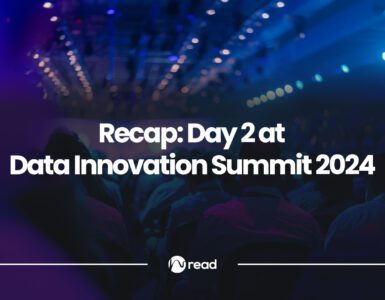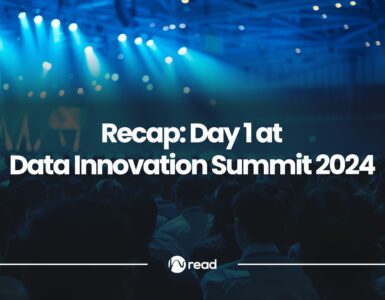During this interview, we had the pleasure of speaking with Klaas Dobbelaere, IIoT & Equipment Connectivity Director at Electrolux Group! In this interview, we discuss key aspects of Electrolux’s journey towards data-driven manufacturing excellence. We cover how Electrolux has embraced data-driven methodologies in its manufacturing operations. And further highlighting major milestones that have driven the company’s success. Furthermore, we discuss the evolution of this journey, learning points gained along the way, and future directions. Additionally, we address potential challenges during the implementation of data-driven strategies and proposed solutions to overcome them.
Hyperight: Can you tell us more about yourself and your organization? What are your professional background and current working focus?


Klaas Dobbelaere: My name is Klaas Dobbelaere, and I serve as the IIoT & Equipment Connectivity Director at Electrolux Group. In my role, I oversee two key areas of focus within our team. Firstly, we actively engage in the industrial internet of things (IIoT). We aim to comprehensively collect data from our manufacturing sites worldwide and translate it into actionable insights. This involves the development of various applications and analytical use cases.
Additionally, we manage OT & equipment connectivity. With this, we focus on establishing standards and best practices for modeling and automating processes within our equipment.
Our efforts encompass automation also called OT, which involves aspects such as programmable logic controllers (PLCs), human-machine interfaces (HMIs), and robotics. We are responsible for guiding and structuring information flow within these systems. As a result, we ensure seamless integration with our IT infrastructure while prioritizing its cybersecurity.
Furthermore, our team assumes operational responsibility for OT (Operational Technology) cybersecurity. This involves safeguarding the integrity and cybersecurity of our manufacturing equipment world wide. While this aspect may be less relevant to the Data Innovation Summit, it is a vital component of our organizational mandate.
My professional background has predominantly been in the manufacturing sector. Initially, I worked as an automation engineer followed by programming and project management for projects related to manufacturing execution systems. Over time, I transitioned into roles focused on data analysis within factories. In 2015, I played a pivotal role in transforming the manufacturing landscape within my previous company. As such, I spearheaded initiatives such as implementing data warehouses and analytics solutions for manufacturing operations.
During the onset of the COVID-19 pandemic, I transitioned to Electrolux. There, I continued to lead initiatives in IIoT and equipment connectivity. My educational background in electrical and automation engineering equips me with a unique perspective, blending technical engineering expertise with an understanding of IT principles. My experience in power distribution further enriches my understanding of complex systems, offering a distinctive perspective in data innovation.
Hyperight: During the Data Innovation Summit 2024, you will share more on “Electrolux continuing journey to data-driven manufacturing excellence.” What can the delegates at the event expect from your presentation?
Klaas Dobbelaere: During my presentation, I will share insights on our ongoing journey towards achieving data-driven manufacturing excellence. Rather than solely focusing on specific use cases, I intend to elaborate on methodologies we’ve adopted to realize this vision. This includes the structuring of our processes encompassing identification, sourcing, qualification, execution, and scalability. Additionally, I will discuss our collaborative approach within our matrix organization. This involves seamless coordination between product lines or business units and our regional setup.
Within our matrix organization, we encounter challenges, particularly regarding alignment, joint prioritization of initiatives, and ensuring cohesive direction across all levels. I will address how we navigate these challenges to foster synergy and unity in our approach.
From a technological standpoint, I will outline how we’ve constructed our platform to facilitate data acquisition, transformation, and consumption across various levels. Our platform-oriented approach empowers individuals within our organization with self-service capabilities. This enables them to ingest and transform data according to standardized models. Moreover, I will emphasize how this platform serves as a foundation for not only our team but also other IT departments to develop applications and analytics use cases for operations at large.
On the business side, I will explore how we empower users with the necessary tools and insights to leverage data effectively. This reduces dependency on external consultants for report generation. By leveraging their expertise and knowledge of the datasets, we aim to facilitate informed decision-making and drive operational excellence within the manufacturing domain.
Hyperight: How has Electrolux embraced data-driven methodologies in its manufacturing operations? What major milestones have propelled the company to excel in this domain?
Klaas Dobbelaere: Electrolux has wholeheartedly embraced data methodologies within its manufacturing operations, marking a significant journey of continuous improvement. Over the past two and a half years, we have established the EMCC platform. This Electrolux Manufacturing Cloud and Connectivity platform, serves as the cornerstone of our technological advancements in this realm.
From an organizational perspective, we have undergone extensive restructuring for the last couple of years. Achieving continued alignment among all stakeholders within manufacturing has been a significant milestone within this context. This has culminated in recent organizational redefinitions that solidify our shared priorities and operational methodologies through the manufacturing digital board and ways of working.
On the technical front, our focus has been on building and refining our platform to meet evolving needs. This platform facilitates data acquisition, transformation, and consumption. Hence, it empowers users with self-service capabilities and enables the development of various use cases. We have successfully scaled up numerous use cases across different stages of the pipeline. These range from identification to execution, demonstrating the maturity and effectiveness of our program.
The culmination of these efforts is evident in our ability to swiftly scale up these use cases across our factories, reflecting the robustness and agility of our approach. Moving forward, we actively committ to advancing our data-driven initiatives to drive excellence and innovation within our manufacturing operations.
Hyperight: How would you describe the evolution of this journey so far, what are the learning points for Electrolux today? What was the starting point, where are you now, and what is next?
Klaas Dobbelaere: One of the most crucial learning points for me, especially transitioning into a larger organization like Electrolux, has been realizing the significant effort required to create alignment. In my previous experience, I was accustomed to a more centrally-driven approach, whereas at Electrolux, the culture is more grassroots-oriented.
Factories enjoy a considerable degree of autonomy, which necessitated a shift in our approach towards persuasion rather than enforcement. Convincing stakeholders of the benefits, both in terms of operational methodologies and the platform we’re building, has been crucial in fostering alignment.
Another key learning has been the importance of stability amidst organizational changes. When I initially joined, our team was relatively small, but we’ve since expanded to eleven members. Providing this stability has been essential, especially considering Electrolux’s journey through various organizational shifts. Flexibility and adaptability have been key. Particularly during periods of economic fluctuation such as the surge during the pandemic and subsequent downturn.
Navigating through these volatile times requires not only technical acumen but also a keen understanding of governance and engagement within business. It’s essential to be sensitive to the challenges faced by different departments and regions. And knowing when to push for change and when to remain flexible. Balancing global templates with local needs demands emotional intelligence, knowing when to act decisively and when to adapt to evolving circumstances. Ultimately, developing this adaptability and emotional intelligence has been crucial in ensuring our success amidst the uncertainties in modern business.
Hyperight: What resources and tools were essential for initiating and sustaining this journey?
Klaas Dobbelaere: One critical aspect I’ve learned is that, it’s essential to have a core team deeply committed to the mission, both operationally and from a management perspective.
However, I must emphasize the invaluable support provided by senior leadership within manufacturing. Their sponsorship was instrumental in driving the significant change management journey we embarked on, transitioning from a legacy organization to a more centrally-driven agenda.
Engaging the right partners to build technical capabilities across the organization has also been crucial. We followed a gradual approach, starting with a limited set of use cases and a bare-bones platform. This approach allowed us to adapt based on available resources and needs, fostering flexibility and adaptability.
Surrounding ourselves with the right partners at the outset of our journey proved invaluable. We learned a great deal about setting up such a platform in a large, typically legacy-driven manufacturing environment. Having the right technical expertise both internally and externally, coupled with senior leadership support for governance and transformation, were indispensable elements for success.
Regarding tools, while there are various options available, it’s essential to recognize that expertise often resides on the shop floor. Enabling these individuals with deep technical knowledge to address day-to-day challenges and optimize equipment functionality yields the most significant value. Therefore, the focus should be on empowering grassroots movements within a globally scalable environment. This can be facilitated by appropriate technical tools capable of supporting such endeavors.
Hyperight: Can you provide further detail on potential challenges that may arise during the implementation of data-driven strategies? What solutions can we employ to effectively overcome them?
Klaas Dobbelaere: When implementing a data-driven strategy, particularly within manufacturing, my approach centers around engaging with individuals possessing functional expertise. They have a deep understanding of the challenges inherent to the equipment and processes within their respective plants.
These individuals, along with experts in specific areas, are crucial in identifying and comprehending the true nature of the challenges we face.
In my experience, the key to success lies in developing technical solutions. Solutions that not only address immediate issues but also have the potential for scalability across the organization. Often, solutions developed within a narrow scope may function effectively within that context but lack scalability. Therefore, it’s imperative to foster a mindset that considers global relevance and scalability from the outset.
Manufacturing environments vary significantly in terms of technical landscapes. But the goal is to create solutions that can be extrapolated and scaled globally. While building a solution for a single instance incurs a certain cost, the cost of replicating that solution across multiple instances increases exponentially. Hence, our aim is to develop enterprise-grade software within a pilot context, with scalability as a fundamental consideration.
The primary challenge in manufacturing data analytics lies in creating solutions that can effectively leverage equipment data to drive insights and improvements. It also involves ensuring scalability across diverse environments.
This necessitates close collaboration with domain experts. Focus on global relevance, and commitment to developing solutions that can be seamlessly scaled across the organization.
Hyperight: What recommendations would you offer to individuals or organizations considering embarking on a similar journey? Drawing from your experience and lessons learned.
Klaas Dobbelaere: When embarking on a transformation journey, securing management support is key. It’s essential to demonstrate to leadership that tangible benefits can be realized in the short term through small, focused use cases. Rather than promising returns in the distant future, it’s more effective to adopt a dual approach. Concurrently building a platform while showcasing immediate benefits. This approach not only bolsters credibility but also instills confidence in the leadership team to continue enforcing governance and methodologies essential for long-term success.
On the bottom-up side, close collaboration with key stakeholders on the shop floor is essential. Articulate initiative benefits for local and broader organization to garner support from those directly impacted by it. Empathy to their challenges and willing to compromise when necessary helps build credibility and foster alignment between local and global objectives.
Selecting the right partner is also critical. Finding a partner with the appropriate technology and expertise is essential, as internal resources alone may not suffice given the technical complexity of modern solutions. Striking the right balance between internal capabilities and external expertise ensures that the initiative is both effective and sustainable.
Ultimately, success hinges on effectively managing three dimensions. Top-down support from management, bottom-up engagement with shop floor stakeholders, and building a core team with the necessary expertise and selecting the right partners. These elements are interconnected and crucial for driving successful data management and transformation initiatives within manufacturing organizations.
Hyperight: According to you, what data management trends can we expect in the upcoming 12 months? What emerging technologies do you believe will have a significant impact on the future of data-driven manufacturing?
Klaas Dobbelaere: In manufacturing, particularly in analytics for industry, one often underestimated aspect is data quality. While data quality in transactional spaces like ERP and financial systems may be more mature, scaling AI and analytics across multiple sites presents significant challenges. This is especially true when dealing with time series data.
Ensuring sensor data quality in manufacturing is a major challenge due to issues like sensor drift, where malfunctions can impact model accuracy. Specific strategies, such as redundancy in sensor systems and accounting for machine breakdowns, are needed to address these challenges.
Despite these challenges, much of the required technical solutions for data management and analytics in manufacturing already exist in other fields. Drawing from advancements in data maturity and technology from sectors like sales, CRM, and finance can significantly enhance manufacturing operations. And while the volume of time series data generated in manufacturing may be substantial, readily available tools and techniques for data management – data catalogs and self-service orientation – can effectively tackle these challenges.
Moreover, it’s essential to acknowledge the complexities of manufacturing data, such as the variability introduced by changing processes and product lines. While manufacturing may have fewer entities compared to other sectors like consumer IoT, the sheer volume and complexity of data per equipment necessitate specialized approaches.
In summary, technological advancements in other domains offer valuable insights and tools. We can adapt and leverage them to enhance data management and analytics in manufacturing operations, despite facing data quality challenges.
Don’t miss on more in-depth insights from Klaas’ presentation on “Electrolux continuing journey to data-driven manufacturing excellence” at the Data Innovation Summit 2024 – it’s happening in less than one week!
For the newest insights in the world of data and AI, subscribe to Hyperight Premium. Stay ahead of the curve with exclusive content that will deepen your understanding of the evolving data landscape.












Add comment